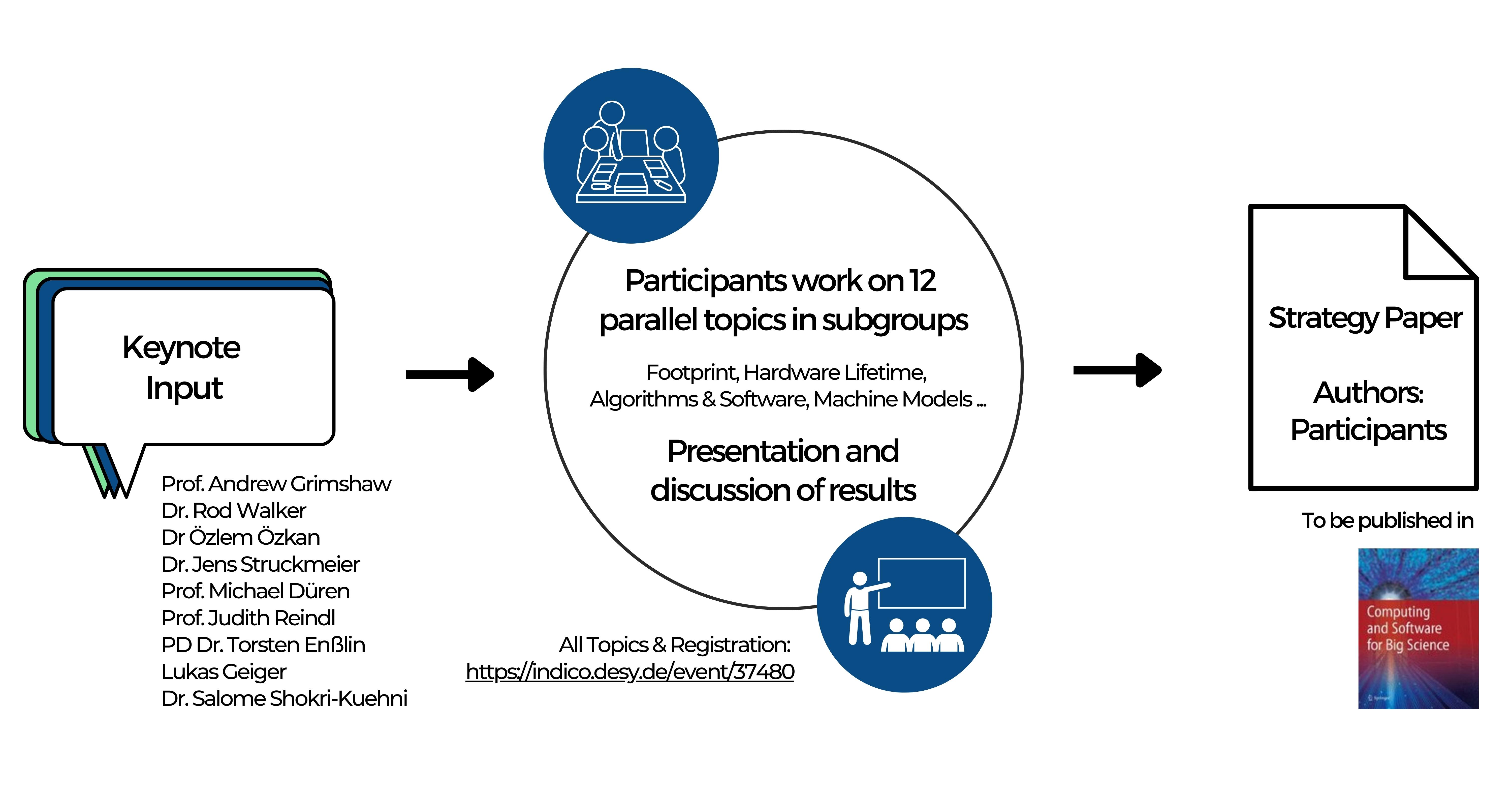Working Sessions Sustainability in ErUM-Data
Wednesday: Hardware & Research Data
1 Footprint: Constructing a comprehensive picture of the footprint of all ErUM-Data related activities. Where does quantitative knowledge exist, where is it lacking? What resource needs do you see, what opportunities for savings? What innovations are needed to keep sustainable use of resources in balance with demands? To what extent does continuing education play a role? How can feedback reduce a footprint through ML methods?
2 [Dynamic] Energy Supply: Where to locate & operate computing systems incl. storage? How could a dynamic energy supply look like, which largely covers the needs of ErUM-Data related activities with renewable energies? What information flows would be required for this? What mechanisms and what dynamics are required on a supra-regional basis to create compensation possibilities for windless/sunless periods?
3 Hardware Lifetime: How could prolonged / optimized usage of hardware resources in view of technology evolution be modeled beyond their usual lifetimes? What short- and medium-term monitoring would be required to signal indispensable replacements on the one hand, and to execute computing jobs matching their algorithmic requirements on prolonged or current hardware on the other?
4 Hardware & Algorithms: Which adaptive measures for hardware and algorithms could have a decisive impact on ErUM-Data? Which types of hardware (including e.g., GPU, TPU, FPGA, neuromorphic computing) could be considered and which automated mechanisms exist for adapting algorithms to non-specific or dedicated hardware?
5 Smart Data: Deciding when and how to discard information without losing scientific value, based on learning from nature and experiment. What mechanisms for transforming data to smart data can be envisioned, and how can evaluation and control of information gain or loss be accomplished? How can archiving and retrieving data be managed?
6 Cultural Change: What could a comprehensive educational area for rethinking, among other things, the use of computer hardware, actually required information (smart data), preparation of data packages (event loops versus event chunks), etc. look like? How can we change to a culture of data reuse? Assessment of ethical implications and risk assessment.
Thursday: Algorithms & Mindset
7 Autonomization: We witness the transfor-mation from the era of automation to an era of autonomization (e.g., unsupervised learning). Where will ErUM-Data benefit from autonomi-zation, which innovations are necessary and how can the reliability of the autonomously obtained results be ensured?
8 Inquiries & Dynamics: How can input questions be posed to generate the best possible output from the machines? What relevance will dynamic learning algorithms and machines have for the field of ErUM-Data?
9 Algorithms & Software: Our thinking in algorithms and software has a direct impact on resource requirements. What can sustainable algorithm & software engineering and an associated educational program in algorithm & software development look like to get ErUM-Data to the forefront of developers?
10 Machine Models: Pre-trained and gene-rative models have a high potential for energy savings in both their creation and usage of machine learning. What innovations are needed to achieve a reliable routine operation?
11 Injected Intelligence: How can reasoning by the physicist, mathematician, or any other kind of intelligence speed up the processes of learning or make them more energy efficient? What measures can we apply to avoid constantly reinventing the wheel? What can knowledge discovery of work already performed look like?
12 Workflow & Stakeholders: How can well-defined, reproducible workflows with high user dynamics (data analyses) be captured that remain functional in the long term? How can an overall picture be created with all stakeholders working together on a large-scale project for the benefit of sustainability across their departmental boundaries?
Working Groups:
https://docs.google.com/spreadsheets/d/1VbRgPPq6wUSz5aJUIcwqFeIQRCUCzHKUshoxzEouEK4/edit?usp=sharing
Keynote Speakers:
- Prof. Andrew Grimshaw, Dr. Rod Walker, Dr Özlem Özkan, Dr. Jens Struckmeier, Prof. Michael Düren, Prof. Judith Reindl, PD Dr. Torsten Enßlin, Lukas Geiger, Dr. Salome Shokri-Kuehni
Prerequisite:
- Your willingness to actively contribute.
Venue & Fee:
- At Landhaus Nordhelle there is a possibility to do sports, hiking and swimming in your spare time. Remember to bring suitable clothing.
- A fee of 350€ will be charged for participation in the course. The workshop fee includes the cost of the workshop, accommodation and catering.
This workshop is supported by:
.jpg)
